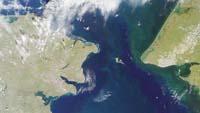The Bering Strait has a lot to say in the climate of ice stations

Fluctuations in the 80km Bering Strait between Russia and Alaska have significantly influenced the northern hemisphere's climate during ice stations, according to a study conducted at the U.S. National Atmospheric Research Center. The appearance and disappearance of the strait seems to be directly related to the fluctuations of the ice sheet in ice ages.
The analysis of the marine sediments of the area and the use of models with supercomputers have given an explanation of this connection. It is explained that when an ice age begins and large layers of ice form, the Bering Strait disappears. In fact, a lot of water is concentrated in these ice sheets and the sea level drops.
Well, in this situation the flow of water that is usually from the Pacific to the Arctic is broken, which makes the entry of water to the Arctic much greater from the Atlantic Ocean. Because the water in the Atlantic Ocean is saltier and temperate than that of the Pacific, the climate in the area is stormed, causing thaw along the Arctic Ocean. Thawing raises the water levels of the Arctic Ocean and, from a moment, reopens the Bering Strait. In this way, the cold water of the Pacific re-enters, cools the climate and starts the process again.





